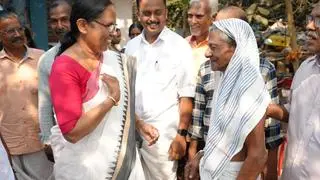A Constitution Bench of the Supreme Court on Tuesday held that only the legislature can recognise or regulate queer marriage.
The Bench reasoned that since there was no fundamental or unqualified right to marry, the courts cannot intervene.
Despite all five judges on the Bench unanimously accepting that laws and society discriminate against same-sex couples, they failed to reach a consensus to provide even long-abiding relationships between queer couples the status of a legally recognised “civil union”.
Chief Justice of India DY Chandrachud, who became a minority on the Bench with Justice Sanjay Kishan Kaul, declared that queer people have a fundamental right to form a relationship, and the state should not fail to give such unions a legal status so that same-sex couples could avail the material benefits provided under the law.
The Chief Justice held that the right to form a union was a feature of the fundamental right to choose partners and lead a dignified, meaningful life. Equality cannot be denied to same-sex couples on the basis of their sexual orientation. Queer persons have a right to form abiding relationships. He said queerness was a natural phenomenon, neither urban nor elite. Besides, the conception of marriage was neither universal nor static.
“It is insufficient if persons have the ability and freedom to form relationships unregulated by the state. For the full enjoyment of such relationships, it is necessary that the state accord recognition to such relationships,” Chief Justice Chandrachud observed.
Justice Kaul agreed that legal recognition to same-sex relationships was a step forward towards “marriage equality”.
Also read: Setback for telcos as Supreme Court holds telecom licence fee ‘capital in nature’
“Legal recognition aids social acceptance, which in turn increases queer participation in public spaces. Through the medium of legal recognition, queer persons will have a greater opportunity to be ‘seen’ and ‘heard’ in ways not previously possible,” Justice Kaul noted.
He said the next step in due course would be to create an “edifice of governance to give meaningful realisation to the right to enter into a union, whether termed as marriage or a union”.
Both judges urged the Centre to constitute a high-powered committee to set out the scope of benefits available to such unions.
However, Justices SR Bhat and Hima Kohli, in their opinion backed by a separate one by Justice PS Narasimha to form the majority judgment of the Bench, held that “an entitlement to legal recognition of the right to union – akin to marriage or civil union, or conferring legal status upon the parties to the relationship can be only through enacted law”.
“Previous judgments of this court have established that queer and LGBTQ+ couples too have the right to union or relationship – be it mental, emotional or sexual - flowing from the right to privacy, right to choice, and autonomy. This, however, does not extend to a right to claim entitlement to any legal status for the union or relationship.
A sequitur of this is that the court cannot enjoin or direct the creation of such regulatory framework resulting in legal status,” Justice Bhat differed from the minority view.
Also read: Supreme Court embraces AI for transcribing live proceedings
Justice Narasimha agreed with Justice Bhat that “a right to a civil union or an abiding cohabitational relationship conferring a legally enforceable status” cannot be squeezed into the Fundamental Rights chapter of the Constitution.
Though Justices Bhat, Kohli and Narasimha said though it was necessary to eliminate the discrimination on non-heterosexual unions, the court cannot mandate the state to grant legal recognition to such relationships.
Justice Narasimha said the creation of new social institutions like same-sex marriage or civil unions and consequent re-ordering of societal relationships were “polycentric decisions” which cannot be rendered by one stroke of the judicial gavel.







Comments
Comments have to be in English, and in full sentences. They cannot be abusive or personal. Please abide by our community guidelines for posting your comments.
We have migrated to a new commenting platform. If you are already a registered user of TheHindu Businessline and logged in, you may continue to engage with our articles. If you do not have an account please register and login to post comments. Users can access their older comments by logging into their accounts on Vuukle.